Key takeaways:
- Eco-tourism emphasizes sustainability, community involvement, and conservation, enriching both traveler experiences and local cultures.
- Choosing eco-friendly destinations involves considering conservation efforts, sustainable accommodations, and supporting local economies.
- Engagement in local customs, such as meal preparation and community initiatives, fosters mutual respect and deeper cultural appreciation.
- Minimizing environmental impact is crucial; small actions can significantly preserve delicate ecosystems and promote sustainable practices.
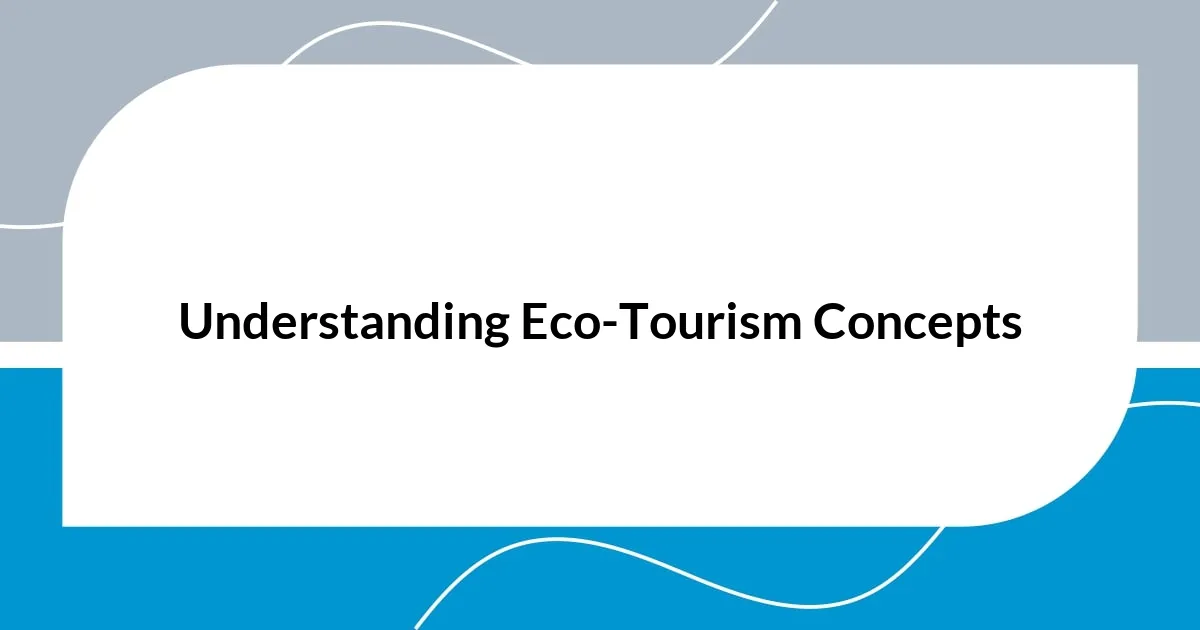
Understanding Eco-Tourism Concepts
Eco-tourism is more than just a trendy travel option; it’s a philosophy that emphasizes sustainability and respect for the environment. I recall visiting a rainforest in Costa Rica, where a local guide explained how each tour is designed to minimize our footprint. Have you ever considered how your travel choices impact the places you visit?
At the heart of eco-tourism is the idea of conservation. When I participated in a tree-planting initiative during my travels, I felt a profound connection to the land. Knowing I was contributing to the regeneration of the forest gave my experience a deeper meaning. Can you imagine the satisfaction of leaving a place better than you found it?
Community involvement is another critical aspect of eco-tourism concepts. On one trip, I stayed with a family in a small village, and they shared their traditions and stories. It was enlightening to see how tourism can empower locals when travelers prioritize authentic experiences over commercialized ones. How does it feel to know your trip can help preserve cultures and support families directly?
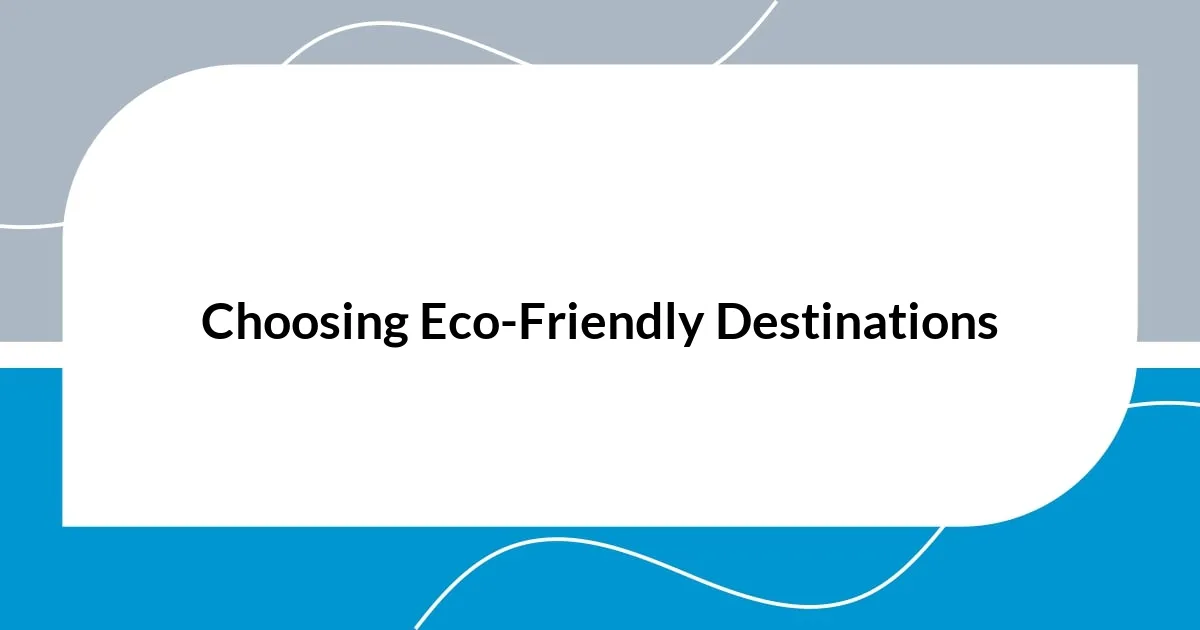
Choosing Eco-Friendly Destinations
When it comes to choosing eco-friendly destinations, I’ve learned that the right location can make all the difference. I remember a trip to a small island in Thailand famous for its commitment to sustainability. There, I found accommodations that used renewable energy sources and preserved local wildlife habitats. It made me appreciate how my choice to stay on that island wasn’t just a vacation; it was a step toward supporting its eco-friendly practices.
Here are some key considerations when selecting an eco-friendly destination:
- Conservation Efforts: Look for locations that actively participate in wildlife conservation or habitat restoration.
- Sustainable Accommodations: Choose hotels or lodges that implement green practices, like solar energy or water conservation.
- Local Community Support: Select destinations that empower local communities through tourism, ensuring your visit contributes to their economy.
- Minimal Impact Activities: Prioritize locations that offer activities designed to have minimal environmental impact, such as guided nature walks or kayaking in sensitive areas.
- Certification: Seek out destinations or accommodations endorsed by recognized eco-certification programs, which indicate a commitment to sustainability.
These factors have dramatically shaped my travel experiences, leading me to destinations where I can feel both relaxed and connected to the planet. I firmly believe that each trip becomes more enriching when aligned with environmental consciousness.
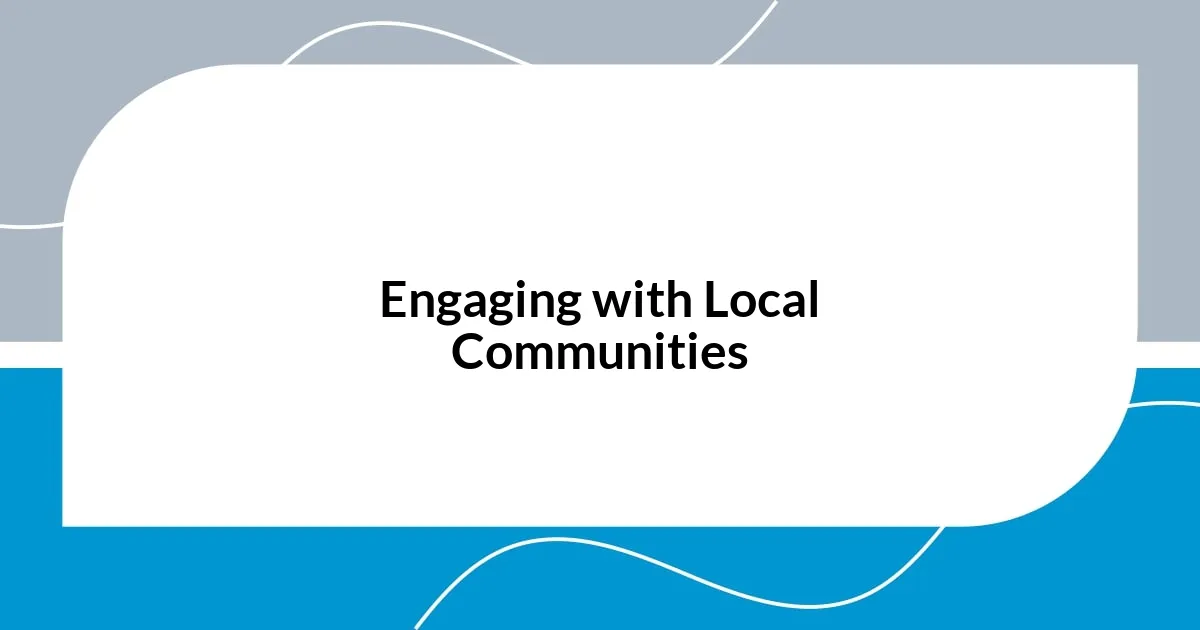
Engaging with Local Communities
Engaging with local communities during my eco-tourism adventures has always added a rich layer to my experiences. On a recent trip to a coastal village in Ecuador, I helped locals prepare traditional meals using their unique cooking methods. The warmth and hospitality I felt at that table—not to mention the delicious food—made me realize how these interactions form bonds that transcend cultural boundaries. Have you ever tasted something that reminded you of a place long after you’ve left?
I find that the more I engage with local customs, the more enriching my travels become. In Morocco, I joined a community initiative to build a library for children. Watching their faces light up as they explored books for the first time was one of the most rewarding moments of my travels. It’s fascinating how these simple acts can create lasting impacts, both for the community and for us travelers seeking genuine connections.
Moreover, participating in local events like festivals or craft fairs often leads to unexpected discoveries about a culture. I remember when I joined a dance celebration in a village square in Peru. Embracing their lively music and traditions, I realized that by sharing such moments, I not only grow as an individual but also contribute to sustaining a vibrant culture. Isn’t it amazing how travel can foster mutual respect and understanding?
| Engagement Type | Benefits |
|---|---|
| Meal Preparation | Creates personal connections and enriches cultural understanding. |
| Community Initiatives | Fosters lasting impact and deepens sense of belonging. |
| Local Festivals | Enhances cultural appreciation and promotes mutual respect. |
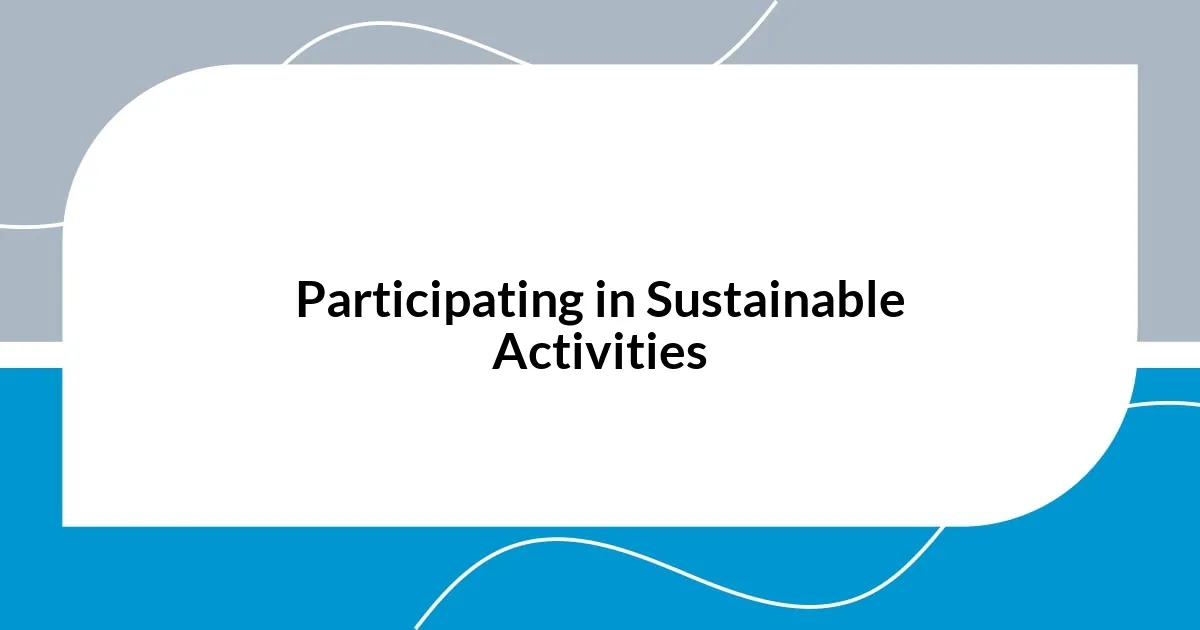
Participating in Sustainable Activities
Participating in sustainable activities during my travels has been both an exhilarating and eye-opening experience. I vividly remember joining a beach cleanup in Costa Rica; as I collected plastic waste with fellow travelers and locals, I felt a tangible sense of purpose. The collective effort not only restored the beauty of the shore but also reinforced my commitment to protecting our environment. Have you ever witnessed the difference a few hands can make in preserving nature?
I’ve also found joy in learning traditional crafts from local artisans, which fosters sustainability through cultural preservation. During a visit to a village in Indonesia, I joined a workshop where we crafted baskets from bamboo. The intricate process taught me the value of slow, mindful creation, transforming a simple object into a cherished piece of culture. It’s incredible how engaging in these activities creates a deeper connection to the places I visit, isn’t it?
Moreover, I find wildlife conservation efforts to be a profound way to give back while traveling. While volunteering with a turtle sanctuary in Mexico, I participated in midnight hatchling releases where the baby sea turtles made their perilous journey to the ocean. Each tiny triumph stirred emotions within me—the vulnerability of those little creatures mirrored the challenges we face in maintaining our planet’s biodiversity. It’s moments like these that inspire me to reflect on my role in environmental stewardship.
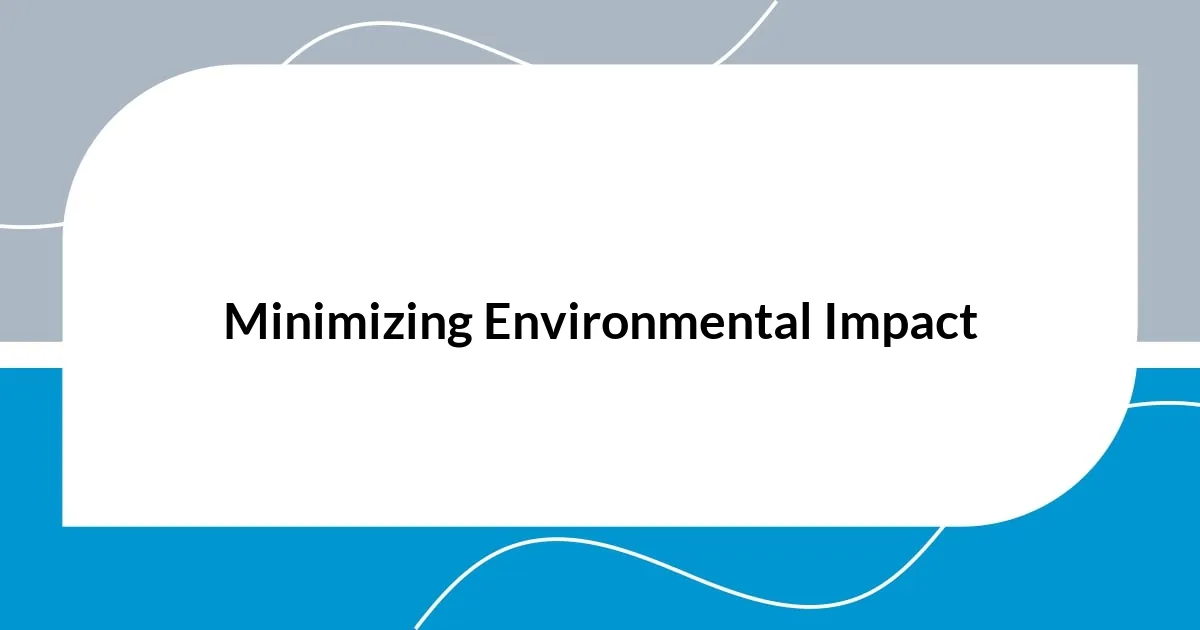
Minimizing Environmental Impact
Minimizing environmental impact is a fundamental principle that I take to heart during my eco-tourism journeys. On a hiking trip in the Rocky Mountains, I was struck by how one small action, like sticking to marked trails, preserves delicate ecosystems. Each time I passed a pristine stream, I couldn’t help but think about how my footsteps—or the absence of them—could determine the habitat’s health. Have you ever considered how your choices affect the environment?
I also remember visiting a remote island where the locals practiced waste segregation at the source. I was amazed to see them compost organic waste and recycle plastic, turning what could have been pollution into resources. Participating in their waste management workshop opened my eyes to sustainable practices I could adopt at home. This experience ignited my passion for being more conscious about my own waste. Have you ever thought about how adopting small habits can lead to significant changes over time?
Another striking moment occurred while I was kayaking in a marine reserve. The guides emphasized leaving no trace—no trash, no noise, just the sound of nature. As I glided over the waters, I realized that the joy of witnessing vibrant sea life was directly linked to our respect for their environment. It makes me wonder: if each traveler committed to such mindfulness, how much more pristine could our cherished landscapes remain?
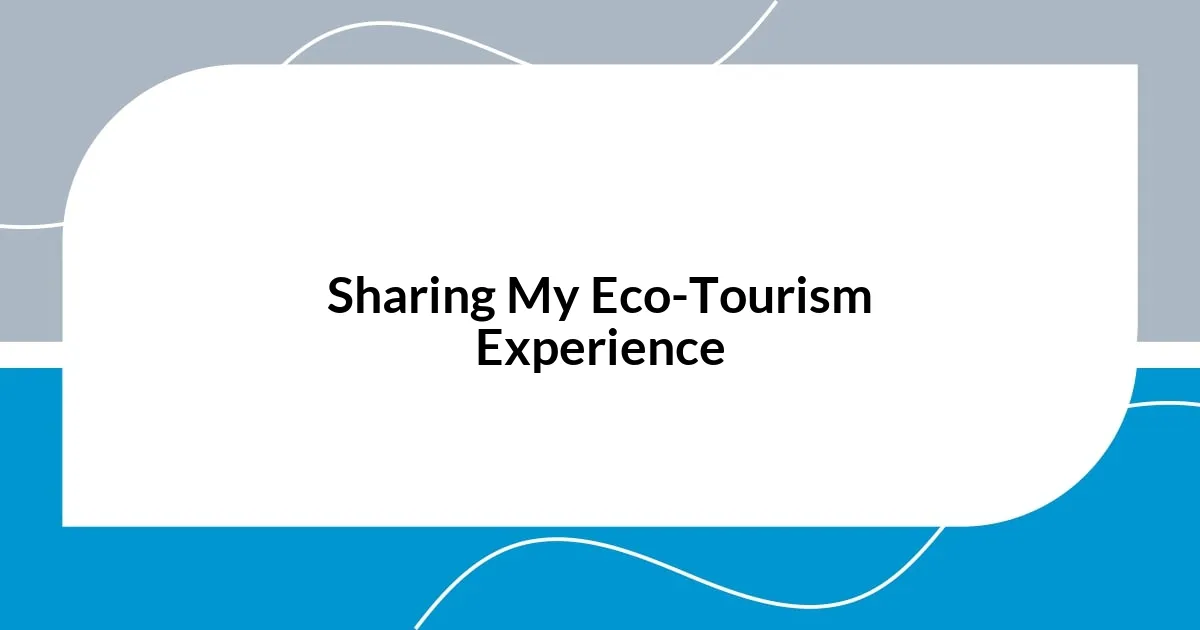
Sharing My Eco-Tourism Experience
Sharing my eco-tourism experience has truly opened my eyes to the profound impact we can have on our planet. I was fortunate enough to visit a national park in Peru, where I participated in a reforestation project with local communities. Planting trees alongside residents not only connected me to the land but allowed me to learn about its history and the challenges they face. Have you ever felt that connection to a place through the hands of others?
Another memorable experience took place while I was in Thailand. I had the opportunity to stay with an indigenous family who practices sustainable farming. As we tended to their rice paddies, I was amazed by their deep understanding of the land and its cycles. It made me consider: how often do we overlook the knowledge passed down through generations? This experience filled me with gratitude and inspired me to implement similar sustainable practices in my own life.
Lastly, I encountered a unique initiative during a trip to South Africa, where conservationists involved tourists in wildlife monitoring. I was thrilled to help track elephants and collect valuable data for research. Each sighting made my heart skip a beat, reminding me of the fragility of these magnificent creatures. When was the last time you actively contributed to the preservation of wildlife? These moments not only enrich my travels; they remind me of my responsibility to protect the earth for future generations.

Lessons Learned for Future Travels
While reflecting on my eco-tourism experiences, I’ve learned that preparation is key. For instance, before a recent trip to Costa Rica, I took the time to research the local customs and environmental challenges. It made a world of difference when I arrived. I felt more connected to the culture and more respectful of their environment. Have you ever felt that sense of empowerment from being well-prepared?
One unexpected lesson came from an exchange with a local artisan I met in Guatemala. As we chatted about their sustainable handicrafts, I realized the importance of supporting local economies while traveling. By purchasing ethically made products, I wasn’t just taking home a souvenir; I was contributing to the community’s well-being. Have you ever thought about how your purchases influence a destination’s economy?
I’ve also come to appreciate the power of storytelling in eco-tourism. On a nature walk led by a passionate guide in New Zealand, I found myself captivated by tales of flora and fauna, woven with cultural history. It drove home the idea that sustainability isn’t just about preservation; it’s about connection. How often do we miss out on deeper experiences by merely skimming the surface? Engaging with local narratives not only enriches our travels but fosters a stronger commitment to protecting these beautiful places for the future.